Energy Conservation for Environmental Protection

Credit: Lightbulbs by Dreamstine is licensed under CC0
Resource Description
Much of the general population believes that the energy sources we depend on are perpetual. While people believe that energy use is the culprit for environmental damage, they are not aware of the methods and principles by which energy conversion devices operate. This course will provide you with knowledge and information on the main operating principles of devices/appliances in common use and will help you in making energy efficient and economical choices. The objective of the course is to expose you to energy efficiency in day-to-day life in order to save money and energy and thereby protect the environment. I hope the information in this course will help you become an environmentally-responsible individual of this Global Village. Learn moreEnergy in a Changing World
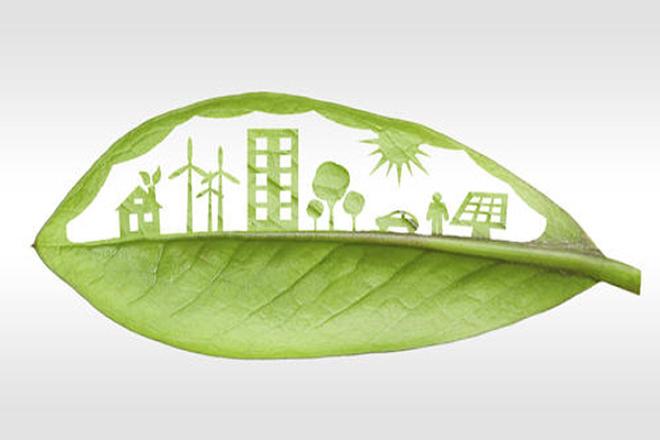
Credit: Green city concept, cut the leaves of plants, isolated over white by kirillov alexey, licensed through Shutterstock used with permission
Resource Description
What is energy? It's the hot in heat, the glow in light, the push in wind, the pound in water, the sound of thunder and the crack of lightning. It is the pull that keeps us (and everything else!) from simply flying apart, and the promise of an oak deep in an acorn. It is all the same, and it is all different. Sunshine and waterfalls won't start your car, and wind won't run the dishwasher. But, if we match the form and timing of the energy with your needs, all of these things could be true. Energy in a Changing World is about the full arc of energy transformation, delivery, use, economics and environmental impact, especially climate change. Learn moreEnergy Policy
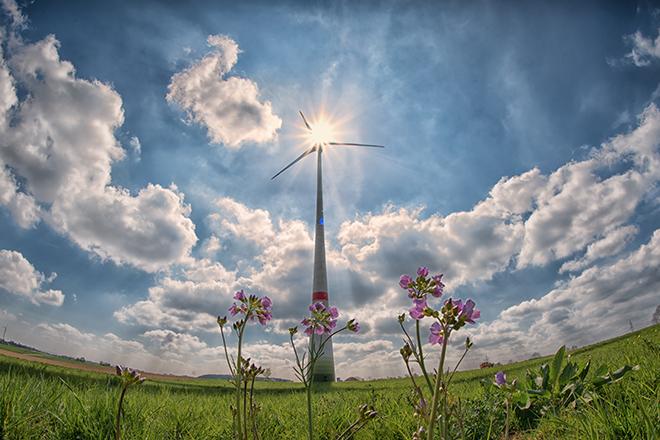
Credit: Purple Flowers by winterseitler is licensed under CC0
Resource Description
Energy policy sits at the crossroads of science and policy. And now, energy and climate policy are inextricably linked; the policies we choose have very real consequences for our climate. This intersection of science and policy is chaotic and bustles with activity motivated by various competing (and conflicting) interests and factors. We must understand the motivations driving them and bridge the divides between our reliance on fossil fuels and our need to transition to less carbon-intensive and renewable alternatives. While the science and math behind these problems is often fairly straightforward, the politics and behavioral changes are not. Come stand at this busy intersection with us as we navigate toward progressive climate policy alternatives at all scales of governance! Learn moreEnvironment and Society in a Changing World
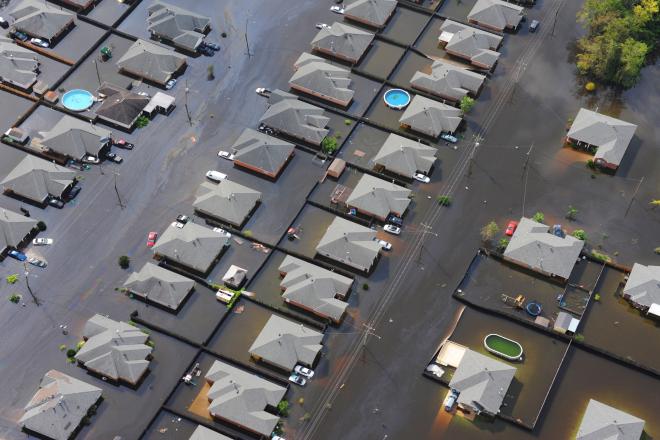
Credit: Ariel view of a flooded neighborhood near New Orleans by Petty Officer 1st Class Matthew Schofield is Public Domain
Resource Description
What factors lead to a natural disaster? What causes a famine? Why do cities flood? According to a recent article in The Atlantic, Houston's flooding during the 2017 Hurricane Harvey was primarily caused by impervious pavement which prevents the absorption of water into the land. This example illustrates how nature and society are interlinked, which is the main focus of Geography 30, Penn State's introductory course to nature-society geography. In addition to examining the linkages between human development and natural hazards, this course will also explore human society's connection to food systems, climate change, urbanization and biodiversity. The course will also cover topics of ethics and decision making in order to help students evaluate the tradeoffs of these interconnections. Learn moreForeign Studies
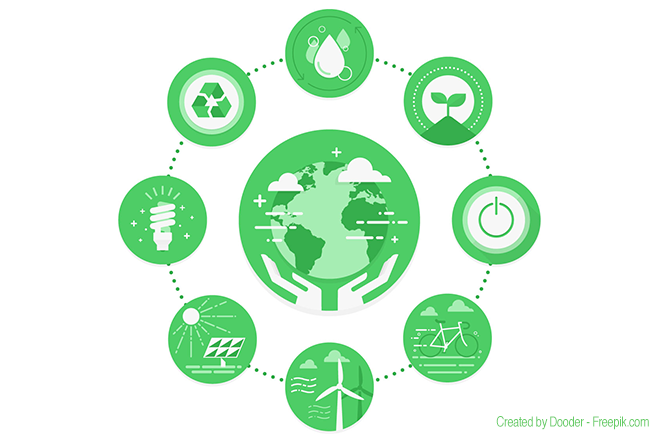
Credit: Green Vector by Dooder is free to use
Resource Description
Are you traveling to another country as part of your college career or supervising someone who is? If so, come explore this foreign study course for the Bachelor's degree in Energy Sustainability and Policy. This course helps students get the most from their experience by providing opportunities for reflection and the creation of a Dossier worthy of sharing with a potential employer. Learn moreFrom Meteorology to Mitigation: Understanding Global Warming
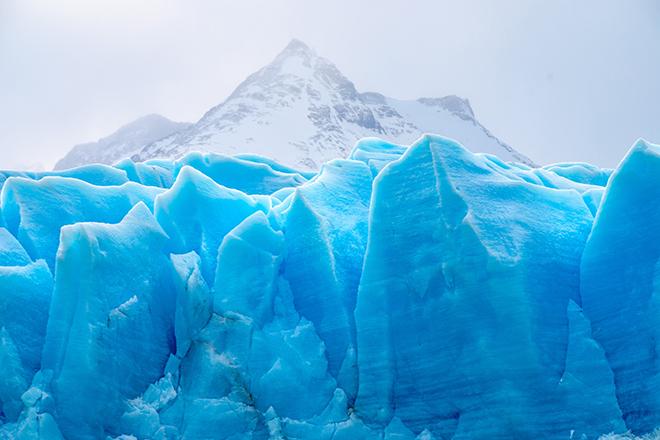
Credit: Blue Icebergs Under Cloudy Sky by Pixabay is licensed under CC0
Resource Description
Human-caused climate change represents one of the great environmental challenges of our time. As it is inextricably linked with issues of energy policy, a familiarity with the fundamentals of climate change is critical for those looking to careers in the energy field. To appreciate the societal, environmental, and economic implications of policies governing greenhouse gas emissions, one must understand the basic underlying science. METEO 469 serves to lay down the fundamental scientific principles behind climate change and global warming. A firm grounding in the science is then used as a launching point for exploring issues involving climate change impacts and mitigation. Learn moreGlobal Energy Enterprise

Credit: Lobbying 161689 by OpenClipart-Vectors is licensed under CC0
Resource Description
Have you seen a Clean Coal baseball cap? In the challenge to meet soaring energy demand with limited resources, volatile issues like those related to the environment, national security and public health are often addressed outside of normal market transactions and are called externalities, or nonmarket factors. Stakeholders can act in resourceful ways to create a nonmarket environment that best serves their interest. A firm may challenge a law that makes it expensive or difficult to do business or compete with others, for example. An individual may organize a boycott of products or services that violate the individual's interests or principles--hey, don't buy from them! Nonmarket strategy in the energy sector is the subject of this engaging course. Learn moreInternship

Credit: Home Office 336373 by Free-Photos is licensed under CC0
Resource Description
Are you participating in an internship or supervising someone who is? If so, take a minute to explore this course that accompanies an internship for the Bachelor's degree in Energy Sustainability and Policy. This course provides students opportunities to creatively reflect on their experiences as well as opportunities to prepare for a job search. Job search preparation is done via a SWOT analysis, resume writing, and a mock interview. Learn moreIntroduction to Energy and Earth Sciences Economics

Credit: Gray Laptop Computer Showing Html Codes in Shallow Focus Photography, by Negative Space from Pexels is licensed under CC0
Resource Description
Introduction to Energy and Earth Sciences is an introduction to microeconomic fundamentals with a focus on the applications of economics to energy and environmental markets. We will introduce the economic method of analysis to the environmental and resource questions facing society. We will learn about the market forces, supply and demand and how they are formed from two concepts of law of Diminishing Returns and Diminishing Marginal Utility. We extend our knowledge by exploring factors such as market dynamics and market equilibrium, government intervention and market power. At the end we will apply these concepts to real life examples and address Climate Change and Carbon Policy, Resource Scarcity and Energy Security, and Changes in the Electricity Business. Learn moreIntroductory Meteorology
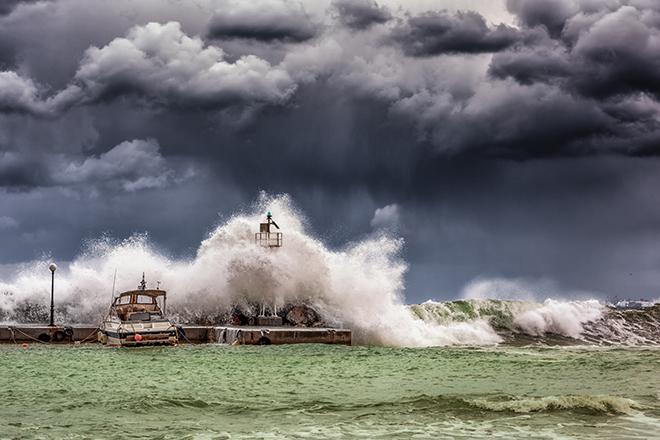
Credit: Big Waves Under Cloudy Sky by GEORGE DESIPRIS is free to use
